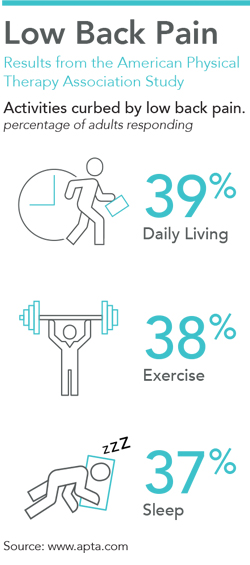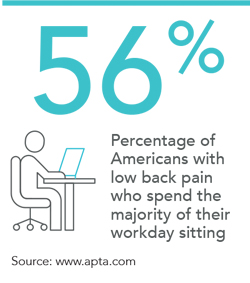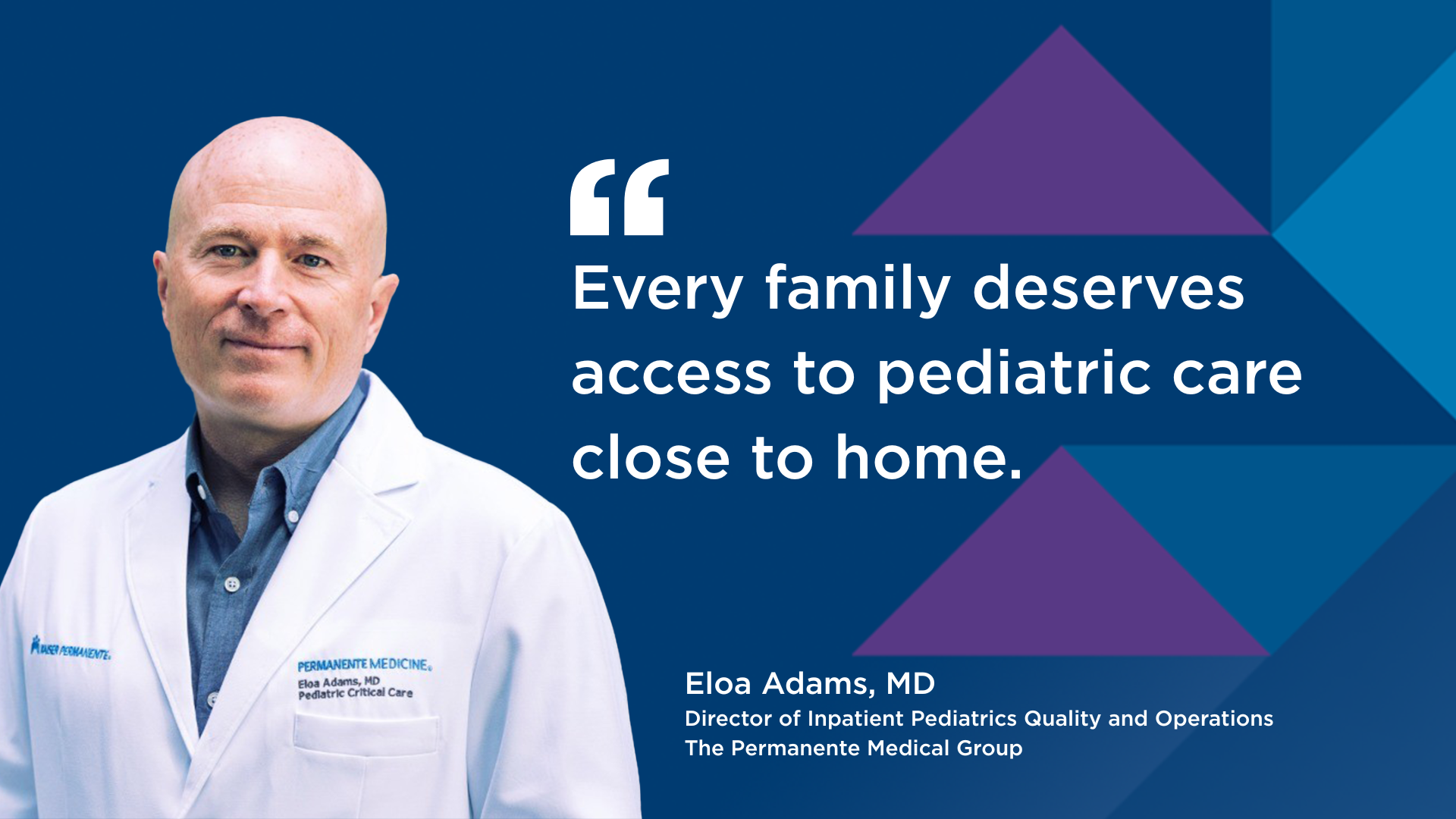Permanente Medical Groups led the U.S. in 2025 HEDIS rankings for preventive care, specialty care, chronic care, and behavioral health care.

Full Service Spine Care
Coordinated Care at Spine Centers Provide Patients with Complete Look at Options
By Benjamin Seto
The Permanente Federation
The majority of Americans will experience low back pain at some point in their lives, and many think of it as a condition they just have to live with. But low back pain isn’t a diagnosis – it’s a symptom.
It’s also the leading cause of disability in the world, and one of the most common reasons for missed work. A 2012 study by the American Physical Therapy Association found that only 37 percent of people experiencing low back pain end up seeking professional help for pain relief.
 “The most important thing for patients suffering from back pain is to get an accurate diagnosis,” says Thomas Krisztinicz, MD, chief of Spine Surgery at the Mid-Atlantic Permanente Medical Group. “Treatment can only be expected to work if the diagnosis is accurate.”
“The most important thing for patients suffering from back pain is to get an accurate diagnosis,” says Thomas Krisztinicz, MD, chief of Spine Surgery at the Mid-Atlantic Permanente Medical Group. “Treatment can only be expected to work if the diagnosis is accurate.”
At Kaiser Permanente, a coordinated care delivery model supported by Permanente Medicine allows a multidisciplinary team of physicians, nurses, surgeons, and other care team members to provide the right treatment at the right time. In several regions, spine centers have been established to help patients navigate to the right treatment programs or surgeries in an expedited way. Identifying the most appropriate care has also helped the organization to reduce referrals for unnecessary spine surgeries.
“We are eliminating inconveniences to the patient by better coordinating their care and empowering them to be active participants in their recovery,” says Kim Thai, MD, regional chief of Physical Medicine and Rehabilitation at the Southern California Permanente Medical Group, which established four regional Spine Centers in Kaiser Permanente Southern California from 2016 to 2017 and plans to open a fifth center in 2018.
Specialty Spine Care Team
When referred to a Spine Center in Southern California, a patient receives an appointment within 48 hours, and a team handles all spine care coordination from that point forward. Each center has a team that includes a physician-in-charge, a case coordinator, a registered nurse practitioner, a clinical specialist in physical therapy, and a licensed vocational nurse. After an initial assessment and hands-on care, specialists evaluate the problem and develop a patient-centered treatment plan.
Patients with back or spine pain will begin care with conservative treatment – including physical medicine, rehabilitation, and pain management – to avoid any unnecessary surgeries. “Our aim is to identify those patients who would benefit from education or pain rehabilitation before we turn to surgery consultations and invasive procedures,” Dr. Thai says.
We are eliminating inconveniences to the patient by better coordinating their care and empowering them to be active participants in their recovery.”
– Kim Thai, MD, regional chief, Physical Medicine and Rehabilitation, Southern California Permanente Medical Group
Last year, Kaiser Permanente Washington piloted a Virtual Spine Care Clinic. The virtual part comes soon after the referral, when a patient speaks on the phone with a patient access representative and then a spine care nurse. Appointments can be made to visit the brick-and-mortar clinic located in the Capitol Hill area of Seattle, with limited appearances in the Tacoma and Everett medical offices.
In Kaiser Permanente’s Mid-Atlantic States Region – which includes Maryland, Virginia, and Washington, DC – a coordinated approach to spine care has been in place for more than seven years. Currently consolidated under the Physical Medicine Departments, the patient benefits from the various specialties that come together to help determine the right treatment plan.
“No single treatment modality is always effective or optimal,” says Dr. Krisztinicz. “Each patient is assessed by an experienced clinician to decide which modality is most suited for that particular patient at that moment in time.” He added that in complex cases, a multidisciplinary spine board gathers to discuss potential treatment options.
Single Point of Contact
In 2016, Kaiser Permanente Northwest launched a virtual Spine Center that serves as a single point of contact for primary care and urgent care physicians to refer members suffering from neck and back pain. Three nurse navigators work with patients to address barriers and facilitate appointments. The navigators collaborate with clinicians from the pain clinic, physiatry, physical therapy, primary care, neurosurgery, orthopedic spine surgery, radiology, and social work/case management.
“This coordinated, collaborative approach makes it easy for members to receive the care they need,” said neurosurgeon Kris Karami, DO. “It prevents redundant appointments and unnecessary surgeries, procedures, and hospital admissions.”
Since launching, the Northwest Spine Center receives an average 35 referrals a day.
In addition to the latest in imaging technology, many of the Kaiser Permanente multidisciplinary spine centers offer other innovations to improve safety, quality, and patient satisfaction, including the following:
- Searchable electronic triage and support system that allows any clinician involved in a case to track the patient’s journey to wellness
- A multidisciplinary conference to facilitate consensus on imaging results
- A multidisciplinary conference to develop a care plan for each patient based on best practices and protocols
Christine Munson, MD, a physiatrist and regional specialty chief of Neurosurgery with the Colorado Permanente Medical Group (CPMG), says patients often express satisfaction when receiving care at a multidisciplinary spine center. “We provide them with the full spectrum of options and treatment, and we manage their expectations,” she says. “Patients find that hearing all the information is helpful, and they tend to be happier.”
 While other therapies are considered before surgery, sometimes surgery may be the most appropriate treatment for a patient. The Permanente Medical Group in Oakland, Calif., which provides care to Kaiser Permanente patients in the Northern California region, established three regional Spine Surgery Centers of Excellence in Oakland, Sacramento, and San Jose. Having specialized orthopedic surgeons operating in one central location – working collaboratively with Neurosurgery – improves their expertise through the volume of procedures. Together, the Northern California spine surgery centers perform more than 3,000 spine surgeries a year – making them one of the busiest spine centers on the West Coast.
While other therapies are considered before surgery, sometimes surgery may be the most appropriate treatment for a patient. The Permanente Medical Group in Oakland, Calif., which provides care to Kaiser Permanente patients in the Northern California region, established three regional Spine Surgery Centers of Excellence in Oakland, Sacramento, and San Jose. Having specialized orthopedic surgeons operating in one central location – working collaboratively with Neurosurgery – improves their expertise through the volume of procedures. Together, the Northern California spine surgery centers perform more than 3,000 spine surgeries a year – making them one of the busiest spine centers on the West Coast.
In the Northwest, Kaiser Permanente member Gail Simmons was referred to the Northwest Spine Center for back pain, and she eventually had surgery performed by neurosurgeon Jason Weinstein, MD, to fuse three vertebrae. Reflecting on her experience, Simmons says: “They did an excellent job to simplify the process for me. I always felt like I was in good hands with Dr. Weinstein, the nurse navigators, and everyone else who took part in my care.”
From the physicians’ perspective, multidisciplinary spine clinics foster a collaborative environment with various specialty clinicians working closely together to share opinions and seek advice from each other.
“In our integrated clinic, people from various disciplines are working next to each other, constantly learning from each other,” says CPMG’s Dr. Munson. “We’re not just communicating via the electronic medical record system, but face to face. Working together closely gets the patient’s needs taken care of quickly, always putting them first.”


